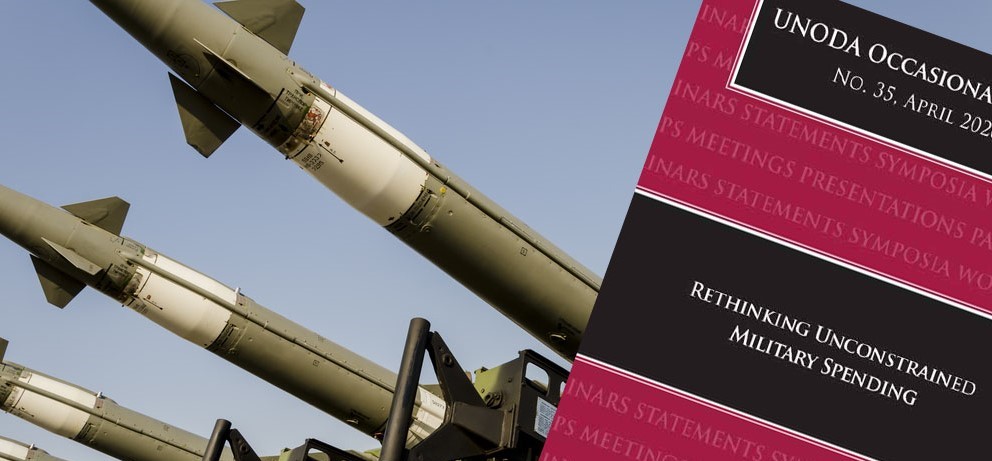In April 2020, the United Nations Office of Disarmament Affairs released a publication Rethinking Unconstrained Military Spending which critiques the massive and growing global military budget (now at $1.9 trillion per year), examines the negative impact of such high militarization on security, explores opportunity benefits of reduced military budgets including to implement the sustainable development goals, and discusses the experience of initiatives to convert weapons production and other aspects of the defence industry to civilian purposes. The publication is a follow-up to the 2019 publication United Nations Efforts to Reduce Military Expenditures: A Historical Overview.
‘The 17 Sustainable Development Goals set out a road map to end hunger, protect the planet, achieve gender equality, improve health and more. It is estimated that the cost to achieve quality universal primary and early secondary education for all (Goal 4) would barely exceed 3 per cent of global annual military spending, while eliminating extreme poverty and hunger (Goals 1 and 2) would amount to only about 13 per cent of annual military spending. Reinvesting 5 per cent of global military spending would also exceed the initial annual costs of adapting to climate change in developing countries (Goal 13). So little could do so much.’
Izumi Nakamitsu, Under-Secretary-General and High Representative for Disarmament Affairs. Foreword to the UNODA publication Rethinking Unconstrained Military Spending.
The publication is useful for legislators and campaigners who are working to cut military budgets and to redirect these funds to support peace, disarmament, climate protection and sustainable development. Of particular insight and value is the 4th chapter From swords to ploughshares: lessons learned from conversion movements, written by Miriam Pemberton, Institute for Policy Studies and William D. Hartung, Center for International Policy.
‘The United Nations should incorporate conversion into its disarmament priorities, including by calling on Member States to prioritize civilian reinvestment that will take up the slack in the economy left by reduced military industrial production, and to develop their own industrial policies to organize that effort.’
Miriam Pemberton and William D. Hartung, Chapter 4, Rethinking Unconstrained Military Spending.
Pemberton and Hartung argue correctly that the powerful lobbying influence of the defence industry is a primary factor in the high and growing military budgets. They also evaluate the experience of military conversion efforts in order to determine why some of these fail, and the factors that contribute to those that are successful. They report on some of the campaigns to cut military budgets and convert the defence sector. And they make comparisons with related campaigns and initiatives including conversion of fossil fuel industries. Finally, they make recommendations for policy-makers on how to better effect budget cuts and military conversion. In general the analysis and recommendations in this chapter are superb.
However, one omission in this chapter is on the importance of military divestment and impact investment. Pemberton and Hartung encourage governments to prioritise civilian reinvestment of their budgets, but they say nothing about investments in the defence industry by banks, pension funds, private investors, public funds, universities, religious organisations, city funds and other investors. Campaigns to shift these investments, including Divest from the War Machine and Move the Nuclear Weapons Money, if picked up by enough campaigners and investors could make a real impact on defence conversion, especially if they are combined with legislative action on budgets, like the SANE (Smarter Approach to Nuclear Expenditure) Act in the USA.
Unconstrained military spending and pandemics
Although the UN paper was published 2 months after the COVID-19 pandemic outbreak, it does not mention the pandemic. Regardless, the analysis and recommendations are even more relevant in a post-COVID world. As highlighted in the May 24 appeal Human security for public health, peace and sustainable development, unconstrained military spending and weapons proliferation hinders the employment of public health measures to address the COVID-19 pandemic and the resources required for mitigation of its social and economic impacts.
‘The Coronavirus pandemic has undeniably demonstrated that key issues of human security cannot be resolved through military means or independently by nations, but require global cooperation and non-violent conflict resolution. The global military budget of $1,900 billion ($100 billion alone on nuclear weapons) should be substantially cut in order to better fund the UN (current budget of $6 billion) and support climate protection, public health, resilient economies and the Sustainable Development Goals.’
Human security for public health, peace and sustainable development, May 24 appeal by 250 women parliamentarians, mayors, religious leaders, former UN officials and leaders of civil society organisations from 50 countries.
In light of the COVID-19 pandemic, some parliaments and governments are considering cuts in military budgets to support public health and economic recovery. However, Professor Erika Simpson reports in the Hill Times on May 25, 2020 that the defence industry and pro-military political leaders and think-tanks are pushing instead for increased military budgets in light of the pandemic. (After the Great Lockdown, far-sighted global cooperation will be heralded and lauded as wise). Professor Simpson notes, for example, that defence experts in the U.S. and at NATO and the EU say that COVID-19 will likely make the world more unstable and insecure, and that ‘therefore military capabilities and spending must better protect defence investments and industry.’
Simpson argues that rather than devoting ‘more resources to research and development of next-generation fighter aircraft, battle tanks, new frigates, lethal autonomous weapons systems in space, and killer drones, we need to focus on sustaining critical industrial and technological capabilities that undergird human security, not militarization.’
‘Many valuable non-defence sector industrial capabilities—like the airline, service and tourism industries around the world—are experiencing incredible risks and may well disappear. To mitigate devastating climate crisis effects and preserve humankind’s long-term future, we need to learn the lessons of the pandemic and understand militaries are not the primary guarantor of security.We should not repeat our past mistakes by allowing defence spending to absorb political attention and material resources that could otherwise be devoted to far more pressing human security challenges.’
Erika Simpson, The Hill Times, May 25, 2020

